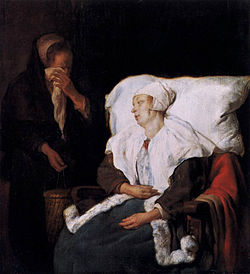Septic shock
(Redirected from Septic Shock)
Editor-In-Chief: Prab R Tumpati, MD
Obesity, Sleep & Internal medicine
Founder, WikiMD Wellnesspedia &
W8MD medical weight loss NYC and sleep center NYC
| Septic shock | |
|---|---|

| |
| Synonyms | N/A |
| Pronounce | N/A |
| Specialty | N/A |
| Symptoms | Fever, chills, confusion, rapid heart rate, low blood pressure |
| Complications | Multiple organ dysfunction syndrome, death |
| Onset | Rapid |
| Duration | Variable |
| Types | N/A |
| Causes | Bacterial infection, fungal infection |
| Risks | Immunosuppression, chronic illness, age |
| Diagnosis | Blood culture, clinical criteria |
| Differential diagnosis | Hypovolemic shock, cardiogenic shock, anaphylactic shock |
| Prevention | Vaccination, infection control |
| Treatment | Intravenous fluids, vasopressors, antibiotics |
| Medication | N/A |
| Prognosis | Variable, depends on severity and response to treatment |
| Frequency | Common in intensive care units |
| Deaths | N/A |
Septic shock is a severe and potentially fatal condition that occurs as a complication of sepsis, an overwhelming and systemic response to infection[1].
Definition
Septic shock is a subset of sepsis in which underlying circulatory, cellular, and metabolic abnormalities are severe enough to substantially increase mortality. It is primarily characterized by low blood pressure that does not adequately respond to fluid resuscitation, along with signs of inadequate organ perfusion.
Pathophysiology
In septic shock, the body's response to infection leads to the release of inflammatory mediators that cause widespread vasodilation, increased vascular permeability, and coagulation abnormalities. This can lead to a decrease in blood pressure (hypotension), inadequate blood flow to the organs (ischemia), and eventual multi-organ failure[2].
Symptoms
Patients with septic shock may initially present with symptoms of infection, such as fever, chills, rapid heart rate, and confusion. As shock develops, they may experience low blood pressure, decreased urine output, rapid heart rate, and altered mental status.
Diagnosis
Diagnosis of septic shock involves identifying the presence of sepsis and the associated organ dysfunction. This can include lab tests such as a complete blood count, blood cultures, coagulation studies, and lactate levels. Imaging studies may also be used to identify the source of infection[3].
Treatment
Treatment of septic shock involves immediate initiation of broad-spectrum antibiotics, fluid resuscitation, and vasopressor therapy to maintain adequate blood pressure. Invasive monitoring may be needed to assess the patient's response to treatment. Source control measures, such as surgical drainage or removal of infected devices, are also important[4].
Summary
Septic shock is a life-threatening condition in which tissues become damaged and blood pressure drops (hypotension) due to bacteria multiplying and producing poisons in the blood
See Also
References
- ↑ Singer, M, The Third International Consensus Definitions for Sepsis and Septic Shock (Sepsis-3), JAMA, 2016, Vol. 315, pp. 801-810,
- ↑ Schouten, M, Inflammation, endothelium, and coagulation in sepsis, Journal of Leukocyte Biology, 2008, Vol. 83, pp. 536-545,
- ↑ Rhodes, A, Surviving Sepsis Campaign: International Guidelines for Management of Sepsis and Septic Shock: 2016, Intensive Care Medicine, 2017, Vol. 43, pp. 304-377,
- ↑ Rhodes, A, Surviving Sepsis Campaign: International Guidelines for Management of Sepsis and Septic Shock: 2016, Intensive Care Medicine, 2017, Vol. 43, pp. 304-377,
Transform your life with W8MD's budget GLP-1 injections from $125.
W8MD offers a medical weight loss program to lose weight in Philadelphia. Our physician-supervised medical weight loss provides:
- Most insurances accepted or discounted self-pay rates. We will obtain insurance prior authorizations if needed.
- Generic GLP1 weight loss injections from $125 for the starting dose.
- Also offer prescription weight loss medications including Phentermine, Qsymia, Diethylpropion, Contrave etc.
NYC weight loss doctor appointments
Start your NYC weight loss journey today at our NYC medical weight loss and Philadelphia medical weight loss clinics.
- Call 718-946-5500 to lose weight in NYC or for medical weight loss in Philadelphia 215-676-2334.
- Tags:NYC medical weight loss, Philadelphia lose weight Zepbound NYC, Budget GLP1 weight loss injections, Wegovy Philadelphia, Wegovy NYC, Philadelphia medical weight loss, Brookly weight loss and Wegovy NYC
|
WikiMD's Wellness Encyclopedia |
| Let Food Be Thy Medicine Medicine Thy Food - Hippocrates |
Medical Disclaimer: WikiMD is not a substitute for professional medical advice. The information on WikiMD is provided as an information resource only, may be incorrect, outdated or misleading, and is not to be used or relied on for any diagnostic or treatment purposes. Please consult your health care provider before making any healthcare decisions or for guidance about a specific medical condition. WikiMD expressly disclaims responsibility, and shall have no liability, for any damages, loss, injury, or liability whatsoever suffered as a result of your reliance on the information contained in this site. By visiting this site you agree to the foregoing terms and conditions, which may from time to time be changed or supplemented by WikiMD. If you do not agree to the foregoing terms and conditions, you should not enter or use this site. See full disclaimer.
Credits:Most images are courtesy of Wikimedia commons, and templates, categories Wikipedia, licensed under CC BY SA or similar.
Translate this page: - East Asian
中文,
日本,
한국어,
South Asian
हिन्दी,
தமிழ்,
తెలుగు,
Urdu,
ಕನ್ನಡ,
Southeast Asian
Indonesian,
Vietnamese,
Thai,
မြန်မာဘာသာ,
বাংলা
European
español,
Deutsch,
français,
Greek,
português do Brasil,
polski,
română,
русский,
Nederlands,
norsk,
svenska,
suomi,
Italian
Middle Eastern & African
عربى,
Turkish,
Persian,
Hebrew,
Afrikaans,
isiZulu,
Kiswahili,
Other
Bulgarian,
Hungarian,
Czech,
Swedish,
മലയാളം,
मराठी,
ਪੰਜਾਬੀ,
ગુજરાતી,
Portuguese,
Ukrainian
Contributors: Prab R. Tumpati, MD


